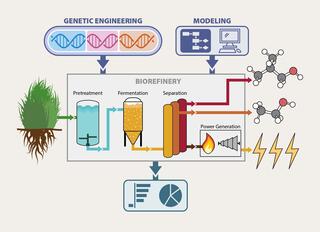Hybrid yeast brews two alcohols for better, cheaper biofuel

The Science
Alcohol made from plants can power airplanes, ships, and other forms of transportation with fewer heat-trapping gasses than fossil fuels. Switchgrass is a perennial plant that grows in poor soils across North America with little or no fertilizer. In this study, researchers created a hybrid yeast that produces two such biofuels, isobutanol and ethanol, from switchgrass. Using the lab results, they developed an economic model to estimate what it would cost to produce the fuels in a commercial plant and identified the key factors that could lower production costs.
The Impact
Compared to ethanol, isobutanol has more energy, is less corrosive, and doesn’t evaporate as quickly when blended with gasoline. It can also be converted into other valuable products, including jet fuel and chemicals used to make solvents and plastics. But producing isobutanol from non-food plants like switchgrass is challenging. Plant fibers have to be broken down to unlock the sugars, which requires a lot of energy. Isobutanol is also toxic to the microbes, which limits the amount most microbes can make, so it has to be removed as it’s produced. Making cost-effective isobutanol requires research to increase yields and lower production costs.
Summary
Scientists with the Great Lakes Bioenergy Research Center crossbred an industrial yeast strain engineered to produce isobutanol with a strain that can tolerate the stress of lignocellulosic hydrolysates, liquids produced by breaking down biomass to release fermentable sugars such as glucose and xylose. The yeast consumed all the available glucose but no xylose. The strategy increased isobutanol yields by producing ethanol at the same time, which helped the yeast survive in the harsh conditions. They also developed a way to recover both alcohols.
Based on the laboratory results, researchers then modeled the production facility to make the fuels and analyzed the cost savings of theoretical improvements at each stage of the process. The combined break-even selling price for biofuels produced with this process would be $11.41 for the energy equivalent of a gallon of gasoline. However, the study found a combination of improvements could theoretically lower the cost to $4.94.
The results suggest scientists should study the feasibility of using less ammonia and enzymes for pre-treatment as well as ways to convert xylose to alcohols in order to make such a biorefinery more economically competitive.
Contact
Arthur Pastore de Lima
University of Wisconsin–Madison
pastoredelim@wisc.edu
Christos Maravelias
Princeton University
maravelias@princeton.edu